Remove the bed plate (A).
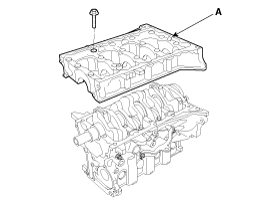
Use fender covers to avoid damaging painted surfaces.
To avoid damaging the cylinder head, wait until the engine coolant temperature drops below normal temperature (20°C [68°F]) before removing it.
When handling a metal gasket, take care not to fold the gasket or damage the contact surface of the gasket.
To avoid damage, unplug the wiring connectors carefully while holding the connector portion.
Mark all wiring and hoses to avoid misconnection.
Turn the crankshaft damper pulley so that the piston of No. 1 cylinder is at TDC (top dead center) on compression stroke.
Remove the engine and transaxle assembly.
(Refer to Engine And Transaxle Assembly - "Engine And Transaxle Assembly")
Remove the transaxle assembly from the engine assembly.
Manual Transaxle :
(Refer to Manual Transaxle System - "Manual Transaxle")
Automatic Transaxle :
(Refer to Automatic Transaxle System - "Automatic Transaxle")
Manual Transaxle : Remove the flywheel.
(Refer to Cylinder Block - "Flywheel")
Automatic Transaxle : Remove the drive plate.
(Refer to Cylinder Block - "Drive Plate")
Remove the rear oil seal.
(Refer to Cylinder Block - "Rear Oil Seal")
Install the engine to engine stand for disassembly.
Remove the intake manifold.
(Refer to Intake And Exhaust System - "Intake Manifold")
Remove the exhaust manifold.
(Refer to Intake And Exhaust System - "Exhaust Manifold")
Remove the EGR cooler.
(Refer to Intake And Exhaust System - “EGR Cooler”)
Remove the thermostat housing.
(Refer to Cooling System - “Thermostat”)
Remove the water pump and the water return pipe.
(Refer to Cooling System - “Water Pump”)
Remove the timing chain.
(Refer to Timing System - “Timing Chain”)
Remove the cylinder head.
(Refer to Cylinder Head Assembly - "Cylinder Head")
Remove the piston and connecting rod assemblies.
(Refer to Cylinder Block - "Piston and Connecting Rod")
Check the main bearing oil clearance.
Remove the bed plate (A).

Check the crankshaft end play.
Lift the crankshaft (A) out of the engine, being careful not to damage journals.
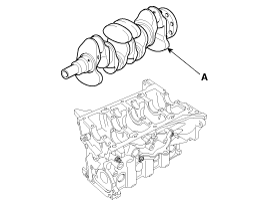
Arrange the main bearings and thrust bearings in the correct order.
Check the crankshaft bearing oil clearance.
To check main bearing-to-journal oil clearance, remove the bed plate and lower bearings.
Clean each main journal and lower bearing with a clean shop towel.
Place one strip of plastigage across each main journal.
Reinstall the lower bearings and bed plate, then tighten the bolts.
Tightening torque
Long bolts :
22.6 ~ 26.5 N.m (2.3 ~ 2.7 kgf.m, 16.6 ~ 19.5 lb-ft) + 90 ~ 94°
Short bolts :
32.4 ~ 36.3 N.m (3.3 ~ 3.7 kgf.m, 23.9 ~ 26.8 lb-ft)
Do not turn the crankshaft.
Do not reuse the main bearing cap bolts.
Remove the bed plate and lower bearing again, and measure the widest part of the plastigage.
Standard oil clearance :
0.024 ~ 0.042 mm (0.0009 ~ 0.0017 in)
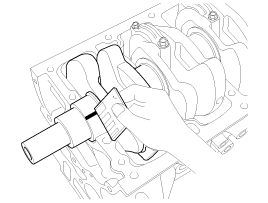
If the plastigage measures too wide or too narrow, remove the upper and lower bearing and then install a new bearings with the same color mark.
Recheck the oil clearance.
Do not file, shim, or scrape the bearings or the cap to adjust clearance.
If the plastigage shows the clearance is still incorrect, try the next larger or smaller bearing.
Recheck the oil clearance.
If the proper clearance cannot be obtained by using the appropriate larger or smaller bearings, replace the crankshaft and start over.
If the marks are indecipherable because of an accumulation of dirt and dust, do not scrub them with a wire brush or scraper. Clean them only with solvent or detergent.
Cylinder Block Crankshaft Journal Bore Mark Location
Letters have been stamped on the front face of block as a mark for the size of each of the 5 main journal bores.
Use them, and the numbers or letters stamped on the crank (marks for main journal size), to choose the correct bearings.
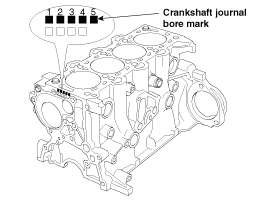
Mark | Cylinder block crankshaft journal bore inner diameter |
A | 58.000 ~ 58.006 mm (2.2835 ~ 2.2837 in) |
B | 58.006 ~ 58.012 mm (2.2837 ~ 2.2839 in) |
C | 58.012 ~ 58.018 mm (2.2839 ~ 2.2842 in) |
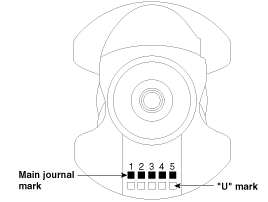
Mark | Crankshaft main journal outer diameter |
A | 53.984 ~ 53.990 mm (2.1254 ~ 2.1256 in) |
B | 53.978 ~ 53.984 mm (2.1251 ~ 2.1254 in) |
C | 53.972 ~ 53.978 mm (2.1249 ~ 2.1251 in) |
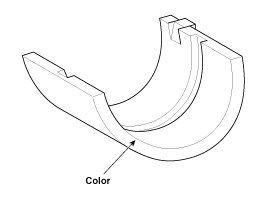
Color | Crankshaft main bearing thickness |
Blue | 1.990 ~ 1.993 mm (0.0783 ~ 0.0785 in) |
Black | 1.993 ~ 1.996 mm (0.0785 ~ 0.0786 in) |
None | 1.996 ~ 1.999 mm (0.0786 ~ 0.0787 in) |
Green | 1.999 ~ 2.002 mm (0.0787 ~ 0.0788 in) |
Yellow | 2.002 ~ 2.005 mm (0.0788 ~ 0.0789 in) |
Select the bearing by using selection table.
Crankshaft main bearing | Cylinder block crankshaft journal bore mark | |||
A | B | C | ||
Crank shaft main journal mark | A | Blue | Black | None |
B | Black | None | Green | |
C | None | Green | Yelllow | |
Check the crankshaft end play.
Using a dial indicator, measure the thrust clearance while prying the crankshaft back and forth with a screwdriver.
End play
Standard : 0.08 ~ 0.28 mm (0.0031 ~ 0.110 in)
Limit : 0.30 mm (0.0118 in)
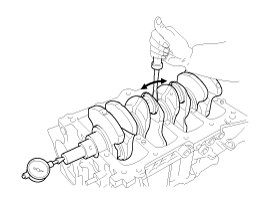
If the end play is greater than specification, replace the center main bearings as a set.
Thrust washer thickness of center main beaing :
2.335 ~ 2.385 mm (0.0919 ~ 0.0939 in)
Inspect the crankshaft main journals and pin journals.
Using a micrometer, measure the diameter of each main journal and pin journal.
Main journal diameter :
53.972 ~ 53.990 mm (2.1249 ~ 2.1256 in)
Pin journal diameter :
45.997 ~ 46.015 mm (1.8109 ~ 1.8116 in)
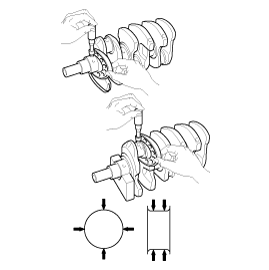
Thoroughly clean all parts to assembled.
Before installing the parts, apply fresh engine oil to all sliding and rotating surfaces.
Install the crankshaft main bearings.
Upper 1, 2, 4, 5 bearings have an oil groove of oil holes ; Lower bearings do not.
Align the bearing claw with the claw groove of the cylinder block, push in the 5 upper bearings (A).
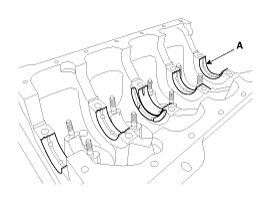
Align the bearing claw with the claw groove of the main bearing cap, and push in the 5 lower bearings.
Place the crankshaft on the cylinder block (A).

Place the bed plate on the cylinder block (A).

Standard liquid gasket : omniFIT FD20, HYLOMAR3000, Dreibond 5105
Check that the mating surfaces are clean and dry before applying liquid gasket.
Apply liquid gasket in a 3mm wide bead without discontinuity.
Install the bed plate bolts.
The bed plate bolts are tightened in 2 progressive steps.
If any of the bed plate bolts in broken or deformed, replace it.
Tighten the bolts (11, 17, 20) in numerical order.
Tighten the main bearing cap bolts (1~10) in numerical order using the SST (09221-4A000).
Loosen the bolts (11, 17, 20).
Tighten the bolts (11~20) in numerical order.
Tighten torque of main bearing cap bolts.
Tightening torque
Long bolts (1~10) :
22.6 ~ 26.5 N.m (2.3 ~ 2.7 kgf.m, 16.6 ~ 19.5 lb-ft) + 90 ~ 94°
Short bolts (11~20) :
32.4 ~ 36.3 N.m (3.3 ~ 3.7 kgf.m, 23.9 ~ 26.8 lb-ft)
Do not reuse the main bearing cap bolts.
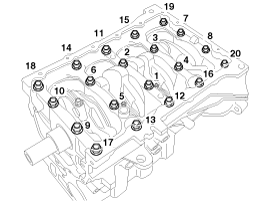
Check that the crankshaft turns smoothly.
Check the crankshaft end play.
Assemble the other parts in the reverse order of disassembly.
In case the crankshaft is replaced with a new one, select the proper connecting rod bearing according to the pin journal mark on the crankshaft.
Connecting rod bearing selection
(Refer to Cylinder Block - "Piston and Connecting Rod")